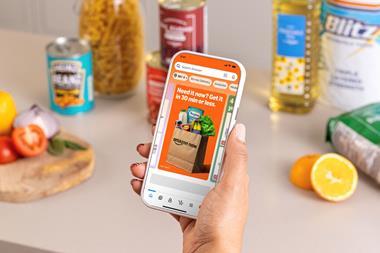As consumers continue to feel the pinch and food waste continues to rise, brands and retailers have a key role to play in helping households get the most out of their fridge and store cupboard leftovers.
At a time when household disposable incomes are already being squeezed by higher mortgage and energy prices, the rising cost of food means that those households who have not changed their shopping habits in the past 12 months are now spending £811 a year more on grocery bills, according to the latest data from Kantar.
And, when uneaten food is discarded, it not only creates unnecessary waste, but it also means consumers will spend additional money to replace it. So, it’s more important than ever that people are supported in their efforts to avoid generating unnecessary food waste in the first place – and businesses have a key role to play.
Cost concerns
Food bills are considered among the hardest costs to tackle; almost two thirds of people (63%) feel it’s more difficult to save on food than on any other household bill. That’s according to a global survey carried out by WRAP and Hellmann’s to mark last year’s International Day of Awareness of Food Loss and Waste.
Reducing household food waste is one way for households to save money; yet in practice people find this difficult to achieve. Almost half (45%) of people surveyed by WRAP and Hellmann’s said they were wasting more or the same amount of food than they were a year ago, a figure peaking at 48% among UK consumers.
Retailers have made positive moves over recent years to reduce waste. Among them is Sainsbury’s which in February announced the launch of £2 ‘Taste Me, Don’t Waste Me’ fruit and vegetable boxes, which feature a variety of surplus fresh fruit and vegetables sold at a lower price.
Such initiatives help reduce some of the waste that occurs on farms and within the supply chain up to and including the retail store. But this needs to be followed through to the customers who shop in those stores to help them reduce waste in the home. Indeed, among the consumers surveyed by WRAP and Hellmann’s, 44% said they need more support on how to be more resourceful with food.
Breaking down barriers
Common barriers people face include getting bored of having the same meals; struggling to cook or consume food before it expires; lacking creativity when it comes to cooking; and finding it difficult to plan what they want for meals in advance. This goes some way to explaining why more than half (57%) of UK shoppers said they would like brands in particular to help them be more resourceful with their food, further emphasising the important role for businesses in supporting consumers to overcome these barriers.
“Food brands and retailers are especially important in helping citizens to waste less in the home, where 70% of food waste arises post-farm gate,” says Catherine David, director for business collaboration and change at WRAP.
She says that as well as using their reach and influence to engage with customers, businesses can make it easier for people to change their behaviour by, for example, selling more fresh produce loose and removing Best Before dates where appropriate.
“They can also ensure products, packs and labels support citizen food waste prevention and help to amplify Love Food Hate Waste messages, like those highlighted in Food Waste Action Week on using up leftovers,” David adds.
By partnering on in-store activations and campaigns, retailers and brands can help encourage consumers to be mindful of food waste during their weekly food shop. Last year, Hellmann’s worked with Tesco to educate shoppers in 400 stores on the most commonly wasted food products.
The tie-up, which featured as part of Tesco’s ‘Better Baskets’ programme, saw Hellmann’s provide shoppers with the opportunity to scan an in-aisle QR code to access tips on how to create a meal at home using these commonly wasted ingredients.

Fridge flex
Engaging customers in novel and interactive ways such as this can make all the difference. Indeed, when Hellmann’s launched a new ‘Fridge Night’ app, which helps people use up fridge items to save money and reduce their waste, take-up was significant. The app encourages users to nominate one fridge night per week on which they’ll cook with a range of ingredients left over in the fridge. It then suggests a number of ‘Flexipes’ – based on a ‘3+1’ approach to cooking whereby users select a base ingredient like a soft wrap, pasta, bread or rice; use up fruit and veggies they have left over in the fridge; add a meat, fish or vegetable-based protein; and finally add a sauce like Hellmann’s.
The app has already received 13,000 downloads and engagement with the campaign continues to grow, according to Georgina Bradford, Hellmann’s marketing director nutrition UK&I. “Our Fridge Night Community to date have already saved 10 tonnes of food, more than £40,000 worth of food waste and over 43 tonnes of CO2, by following recipes that use up ingredients left in the fridge,” she says.
The app is designed to engage consumers with the challenge of food waste in a fun, accessible way with gamification a key component. Those who download the app are able to earn points by completing challenges.
“We have made it our mission to inspire and help shoppers make a difference with simple and easy ways to waste less food at home and this will always be a part of what drives our campaign forwards,” adds Bradford.
Veg impact
Finding ways to use up old vegetables can be especially impactful. Vegetables are the most wasted food items, according to WRAP and Hellmann’s, followed by fruit and leafy greens. At 16.3%, fresh food inflation is currently running higher than the overall average for food which means the most wasted household food items are also the most expensive relative to a year ago.
There are additional benefits to reducing household food waste beyond cost. Helping shoppers create balanced meals out of leftover fruit and vegetables can support good nutrition and help deliver national and business net-zero commitments. WRAP estimates that equivalent to 35% of the UK’s greenhouse gas emissions come from food and drink of which almost a quarter (23%) is linked to the production and distribution of food that ultimately becomes waste.
All the evidence points to one simple fact: tackling food waste before it occurs is a win-win both for businesses and their customers.
Find out more on our website - https://www.hellmanns.com/uk/fridge-night.html























